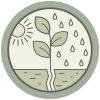
Resilience: enhanced resilience of people, communities and ecosystems is key to sustainable food and agricultural systems
Diversified agroecological systems are more resilient – they have a greater capacity to recover from disturbances including extreme weather events such as drought, floods or hurricanes, and to resist pest and disease attack. Following Hurricane Mitch in Central America in 1998, biodiverse farms including agroforestry, contour farming and cover cropping retained 20–40 percent more topsoil, suffered less erosion and experienced lower economic losses than neighbouring farms practicing conventional monocultures.
By maintaining a functional balance, agroecological systems are better able to resist pest and disease attack. Agroecological practices recover the biological complexity of agricultural systems and promote the necessary community of interacting organisms to self-regulate pest outbreaks. On a landscape scale, diversified agricultural landscapes have a greater potential to contribute to pest and disease control functions.
Agroecological approaches can equally enhance socio-economic resilience. Through diversification and integration, producers reduce their vulnerability should a single crop, livestock species or other commodity fail. By reducing dependence on external inputs, agroecology can reduce producers’ vulnerability to economic risk. Enhancing ecological and socio-economic resilience go hand-in-hand – after all, humans are an integral part of ecosystems.
